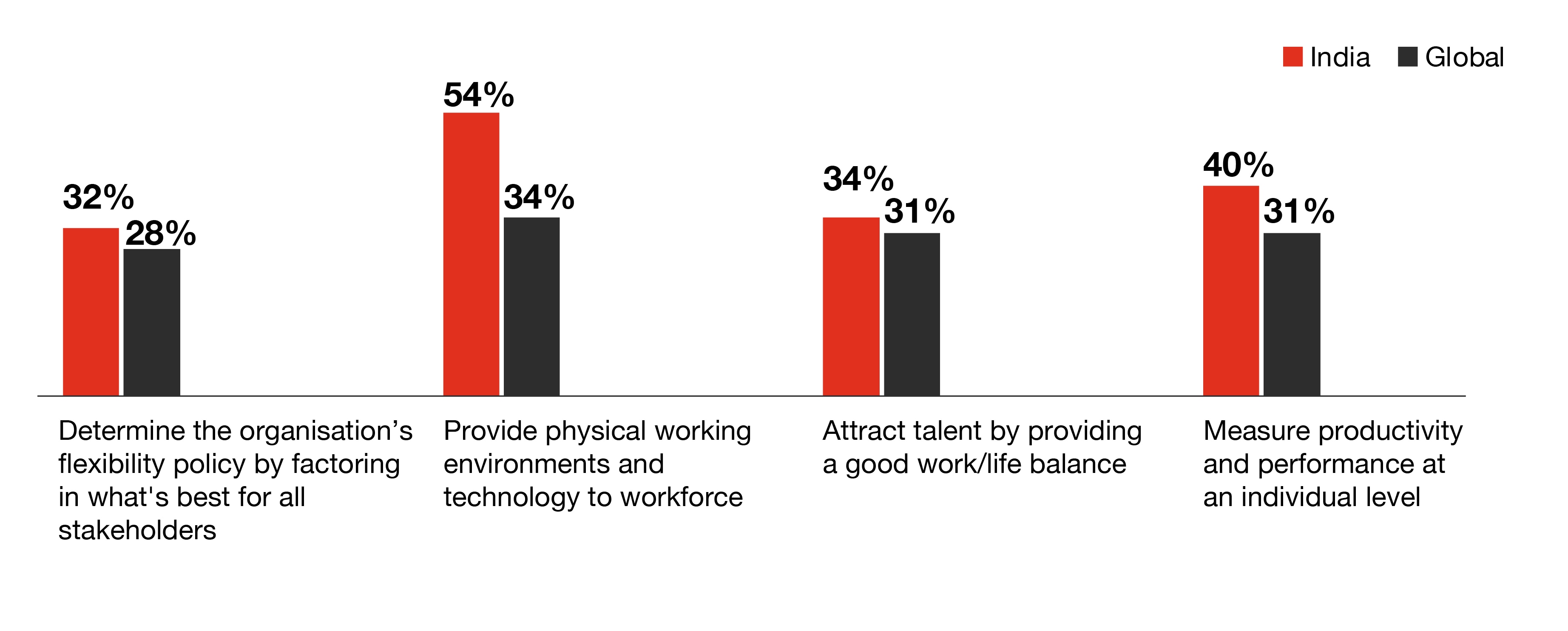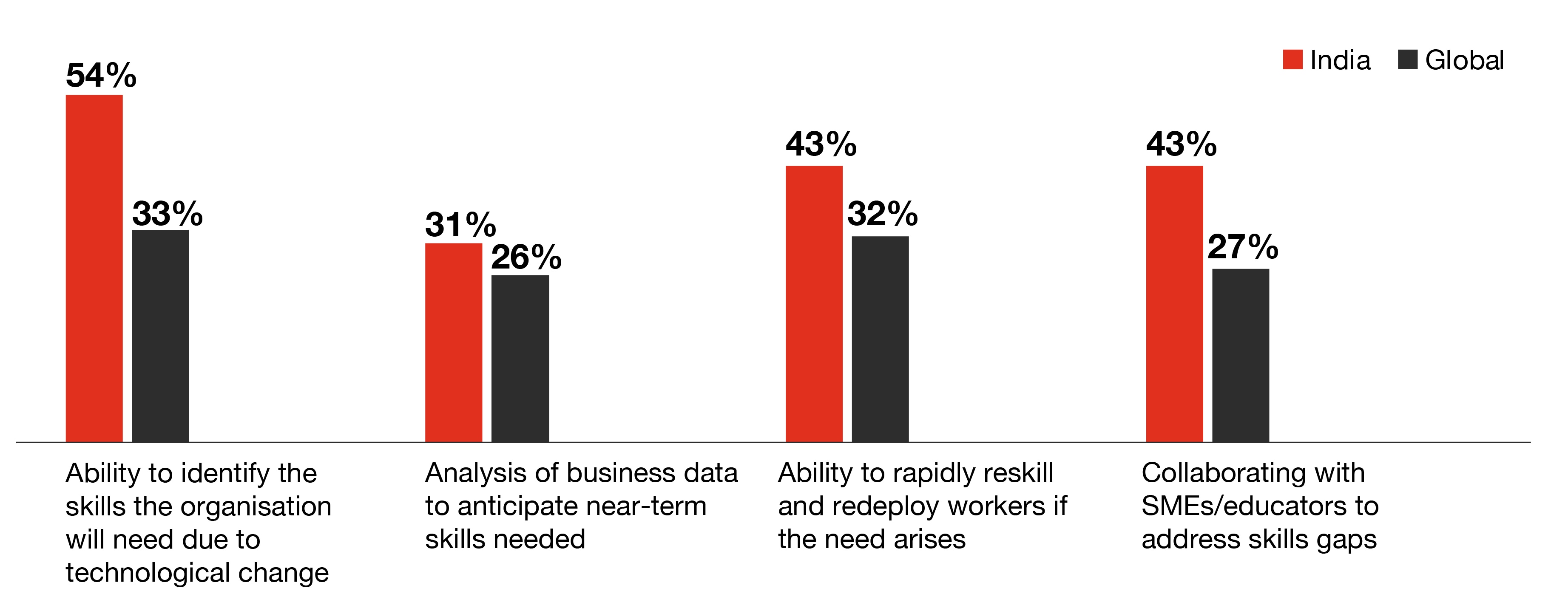{{item.title}}
{{item.text}}

{{item.text}}
From virtual to hybrid – over the last couple of years, there has been a significant change in the way we work. If productivity and connectivity were the driving forces of the virtual world after the onset of the pandemic, it’s a plethora of choices combining the physical and virtual that govern the hybrid world to which we are now shifting.
With a change in work, workplace, work culture and workforce dynamics, accelerating the transformation journey at the workplace is now a priority with most organisations.
Our report, People and culture first: Transformation journey in the future of work, deals with all this and more. It is based on the global Future of Work and Skills Survey conducted in September 2021 in which nearly 4000 business and HR leaders across 26 countries and 28 sectors participated. The report provides insights into the challenges and impediments that often prevent organisations from becoming future ready, and highlights the necessity of empathising and simultaneously embracing debate and dissent.
Identifying the risks of replacing human work with technology
Communicating clearly about the effect of automation and artificial intelligence (AI) on future skills needs
Providing physical working environments and technology that enable all workers to perform at their best
Over the past two years, the pandemic has forced leaders to question their choices on many aspects affecting their organisations, right from people to culture to technology. They have realised, as this Future of Work and Skills Survey indicates, that along with organisational strategic intent and system optimisation, other actions are to be considered to future-proof organisations and bring about the desired transformation. They need to proactively act on workforce initiatives, build capability in a well-considered way, and, among other things, work towards making their culture more resilient in order to be future ready. This understanding has triggered their identification of six no-regrets moves to prepare for the future of work and win in the workplace before winning in the marketplace.
As organisations face an increasingly uncertain future, planning is more important – and more difficult – than ever before. The main blockers to anticipating and planning for the future highlighted by India leaders were cost pressure, fear of potential consequences of taking action, and lack of business capability to deliver.
Recognise ‘prioritising and sense making’ as an organisational capability that is critical to drive investment decisions. Leaders need to be aware that committing to both types of planning – scenario based and dynamic – infuses a flexibility that factors in the depth of possibilities and breadth of capabilities.
Building trust in the organisation with the leadership ably setting the tone at the top is a significant lever to prepare for the future of work. PwC research has demonstrated that people want to work for employers that show they care. They also want the organisations they work for to live up to their purpose and values. But now, as organisations move to virtual and hybrid workplaces, they face the hard reality of building commitment and driving joint success without building personal bonds.
Democratise the workplace concept to focus on a ‘workplace of the people’ as against a ‘workplace for the people’. Building trust entails an open and inclusive organisational culture, where people take equal ownership of their workplace to deliver their best.
Gone are the days of monitoring employees. Now is the time for leaders to build an environment that supports sustainable and consistent productivity. But productivity shouldn’t emerge at the expense of well-being; rather, it should be an outcome of well-being. The main blockers to optimising workforce productivity and performance, as highlighted by India leaders, were issues with systems and data, cost pressure, organisational culture and competing investments or priorities.
Use technology to enable productivity and performance, while management enables culture. If productivity and performance are measured by technology, management could primarily focus on building organisational culture.
It’s imperative that businesses create a culture of continuous learning, invest in systems and maintain an inventory of current and future skills to leverage learning and development as a competitive advantage. But the main blockers to enabling the skills of the future, as highlighted by India leaders, are related to cost pressure, organisational culture, fear of potential consequences, lack of senior leadership and business capability to deliver and competing investments or priorities.
Prioritise culture as a competitive advantage. Leaders need to build a culture that has a laser focus on the long-term development of people.
Digitisation will continue to be a top concern for leaders and a source of anxiety for workers. But the pandemic proved the importance of technology in engaging customers, freeing employee bandwidth for more intellectual rather than mundane tasks, creating new ways of working and even promoting productivity.
Focus on human-led, tech-enabled ways of working. The future of work demands that people drive technology, rather than being driven by it.
Even as organisations think about how to make in-house workers more agile, it’s important that they increase their recruiting capabilities and simultaneously focus on internal mobility and redeployment by taking initiatives to reskill and redeploy their workforce.
View the organisation in the ‘skills and capability age’. Leaders need to develop the ability to upskill, reskill and enhance in-house workers’ long-term employability and be open to leveraging the gig economy.
The calls to action highlight the need to focus on the following three critical questions to action the six no-regrets moves.
Are we valuing capability and culture to drive organisational performance and productivity?
Are we readying ourselves for the ‘Skills Age’?
Are we holding ourselves accountable for prioritising the right investment decisions?
In September 2021, PwC commissioned a global survey of 3,937 business executives and HR-focused leaders. The survey polled leaders in 26 countries across 28 sectors. Of these, 210 leaders were from India and included 51% senior or business leaders and 49% HR-focused personnel.
Among the 210 Indian leaders who participated:
70%
were from sectors such as banking and capital markets, healthcare, industrial manufacturing, retail and technology, and the rest were from other sectors such as agriculture, education and business/professional services
50%
of the organisations were listed companies
65%
of the organisations had a revenue above USD10 million
The findings in this report have been crowdsourced from
Leader inputs from the Future of Work and Skills Survey
PwC thought leadership
Insights from the Excellence in the new ecosystem: A PwC and NHRDN perspective
Following the launch of People and culture first: Transformation journey in the future of work report, we connected with 50+ industry stalwarts. They provided their perspectives on the future of work, amplifying the implications of our global survey findings for their respective sectors and organisations.
Click here to download the Industry leaders' perspectives report
{{item.text}}

{{item.text}}













